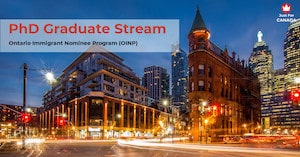Home > Permanent Residence > Provincial Nominee Programs (PNP) > Ontario Immigrant Nominee Program (OINP) > OINP - PhD Graduate (PG) Stream
The guide below takes a deep look into one of the streams of Ontario's Provincial Nominee Program (OINP), the PhD Graduate (PG) stream. The guide will go through an overview of the stream, its eligibility requirements, how it works, the documentation needed, its cost and processing times.
Overview of the PhD Graduate (PG) stream
|
The PhD Graduate (PG) stream is one of Ontario's PNP streams that is dedicated to international students who have completed their PhD degree in an eligible university in Ontario.
When receiving a nomination under the PG stream, candidates can then apply for Permanent Residence to the federal government of Canada. |
This stream is not aligned with Express Entry, which means that candidates cannot take advantage of the 6-month average processing times of Express Entry. Processing times of Provincial Nominee Programs (not aligned with Express Entry) are usually longer and take at least 1 year.
The PG stream does not require a valid job offer or work experience in its eligibility requirements. You need to provide proof of having enough liquid funds to support yourself and support your family. You can find more information in the Eligibility Requirements section.
This PG stream is point-based, meaning that the OINP will only invite the highest ranking candidates to apply.
The PG stream does not require a valid job offer or work experience in its eligibility requirements. You need to provide proof of having enough liquid funds to support yourself and support your family. You can find more information in the Eligibility Requirements section.
This PG stream is point-based, meaning that the OINP will only invite the highest ranking candidates to apply.
Eligibility Requirements
There are 7 categories of eligibility requirements that we will summarize below. You can apply to the PhD Graduate (PG) stream if you satisfy to all the requirements below. Again, there is no need to have a job offer to qualify.
1. Education
To be eligible to the PG stream, you must have:
If you are have received a scholarship or fellowship that requires you to return to your home country at the end of your studies, you cannot apply to this stream. You need to fulfill the requirements of your scholarship or fellowship before applying, if possible.
1. Education
To be eligible to the PG stream, you must have:
- have lived legally in Ontario for at least two years during your PhD studies, and
- been awarded a PhD degree from one of the universities listed below.
If you are have received a scholarship or fellowship that requires you to return to your home country at the end of your studies, you cannot apply to this stream. You need to fulfill the requirements of your scholarship or fellowship before applying, if possible.
Eligible universities in Ontario
- Brock University
- Carleton University
- Dominican University College
- Lakehead University
- Laurentian University
- McMaster University
- Nipissing University
- Queen’s University
- Royal Military College of Canada
- Toronto Metropolitan University (formerly Ryerson University)
- Saint Paul University (Federated with the University of Ottawa)
- St. Jerome’s University (Federated with the University of Waterloo)
- Trent University
- University of Guelph
- University of Ontario Institute of Technology
- University of Ottawa
- University of St. Michael’s College (Federated with the University of Toronto)
- University of Toronto
- University of Trinity College (Federated with the University of Toronto)
- University of Waterloo
- University of Windsor
- Victoria University (Federated with the University of Toronto)
- Western University
- Wilfrid Laurier University
- York University
2. Residence in Ontario
You must have resided in Ontario of at least 1 year during the past 2 years before applying.
3. Settlement funds
You need to own a minimum amount of liquid funds when you apply for this stream. The amount is based on the required federal settlement funds, and depend on the number of family members (accompanying you or not). You can find the amounts required here.
However, the requirement in Ontario are a little different from the federal ones. There is one important case of discrepancies to note:
- If you are allowed to work in Ontario and have a job offer, you do not need to provide proof of funds under the federal rules. However, under the PG stream, you need to count the annual wages of your job offer (if you have one) towards your settlement funds. For example, if the salary from your job offer is 28,000$, and your required settlement funds are 32,000$, then you need to only provide proof of owning 4,000$ (the difference between 32,000$ and 28,000$) of liquid funds.
4. Intent to settle in Ontario
OINP will assess this through a series of factors, such as past studies, work, or tourism in the province, having family members or personal relationships residing in Ontario, etc.
You will need to list all ties that you have to the province, including family, friends, prior studies, prior or current work experience, prior visit, etc. Remember to add any document that could support the claims you are making.
5. Legal status in Canada
When applying from inside Canada, you need to have the appropriate legal documentation to prove you are in the country legally, either a Work Permit, a Study Permit, etc. You should keep your status until you are nominated.
6. Application period
You can apply to the PG stream within 2 years after the date on your degree. For example, if the date on the PhD degree is February 5th, 2019, you cannot apply after February 5th 2021.
7. Receive an invitation to apply
In order to be considered for this PG stream, you must register an Expression of Interest (EOI) in the OINP e-Filing Portal. Based on your profile, the OINP will assign you a score under the PG stream.
The OINP will invite the highest ranking candidates to apply either on a general basis (rank all candidates who registered an expression of interest) or on a targeted basis (rank only those candidates who have one or more targeted labour market or human capital attributes).
The following are the scoring factors used in this PG stream:
Work/study permit status
- With valid work or study permit – 10 points
- Without valid work or study permit – 0 points
- CAD 40,000 or more earnings in a year – 3 points
- Less than CAD 40,000 earnings in a year – 0 points
- PhD – 10 points
- Masters – 8 points
- Bachelors or equivalent – 6 points
- Graduate diploma or certificate – 6 points
- Undergraduate diploma or certificate – 5 points
- Apprenticeship or trades certificate or diploma – 5 points
- College diploma or trade certificate – 5 points
- Less than college or trade certificate – 0 points
- STEM/Health (Engineering, Health, Math, Computer Science) and Trades (agriculture and natural resources operations and management, mechanics and repair, architecture, construction and precision production) - 12 points
- Business and administration, social, legal, education, behavioral science, personal, security and transport services, social work and related programs - 6 points
- Arts and humanities, business, humanities, arts, social science and education (BHASE), programs and programs that are not elsewhere classified (n.e.c) - 0 points
- More than one Canadian credential – 10 points
- One Canadian credential – 5 points
- CLB9 or higher – 10 points
- CLB8 – 6 points
- CLB7 – 4 points
- CLB6 or lower – 0 points
- 2 Official Languages – 10 points (min. CLB7 in one official language and a min. CLB6 in the second official language)
- 1 Official Language – 5 points
- Northern Ontario – 10 points
- Includes the following Census Divisions: Muskoka Haliburton, Nipissing, Parry Sound, Manitoulin, Sudbury, Greater Sudbury/Grand Sudbury, Timiskaming, Cochrane, Algoma, Thunder Bay, Rainy River and Kenora
- Other areas outside GTA (except Northern Ontario) – 8 points
- Includes all Ontario regions except those listed as part of Toronto, the Greater Toronto Area and Northern Ontario
- Inside GTA (except Toronto) – 3 points
- Includes the regional municipalities of Durham, Halton, Peel and York
- Toronto – 0 points
- Includes the City of Toronto
- Credential was completed without physically attending (in-person) classes – 0 points
- As determined by OINP – 10 points
Application Process Summary
For a better understanding of the process, below is a list of the steps involved in obtaining Permanent Residence through the PhD Graduate (PG) stream. Candidates must:
- Create a profile in the OINP e-Filing Portal.
- Register an expression of interest for the PG stream.
- After receiving an invitation to apply, apply to the PG stream within 14 days by submitting their application through the OINP e-Filing Portal (filling in forms and uploading required documents).
- Apply for permanent residence to the federal government (IRCC) within 6 months of receiving the nomination (after OINP processes their application). Candidates need to apply on paper to IRCC, and include the Nomination Approval Letter and the Certificate of Nomination received from OINP.
Application Fees
The fee for this stream is quite expensive, the most expensive in all other Provincial Nominee Programs. It is set at 1,500 CAD. It can only be paid by a credit or debit card (Visa or MasterCard).
Application fees can only be refunded if the processing of the application has not started, either (i) if the applicant withdraws his/her application before processing starts, or (ii) if the application is refused as being incomplete by the OINP.
Application fees can only be refunded if the processing of the application has not started, either (i) if the applicant withdraws his/her application before processing starts, or (ii) if the application is refused as being incomplete by the OINP.
Processing Times
As of January 11, 2024, the processing times for a PhD Graduate stream application are estimated to be between 30 to 60 days. However, some applications may need more time to be processed if more complex or necessitate more documents and/or information.
Stream Opening History
You can check out our awesome Live PNP Monitor to see the latest news and draw history on the PhD Graduate stream, as well as for all the other PNP streams.
Do I have to stay in the Province?
This is a tricky question and there are multiple situations that can happen. You can learn more about this subject on our dedicated article: Can I move to another province?
Does the Stream have In-Demand Jobs?
Some streams target specific NOC codes, meaning that if you have experience in those in-demand jobs, you either (i) have more chances to be invited or (ii) that you can be eligible to the stream. In the case of the PhD Graduate stream, there is no in-demand list. You can find out about the other provinces' in-demand jobs in our in-demand NOC codes article.



